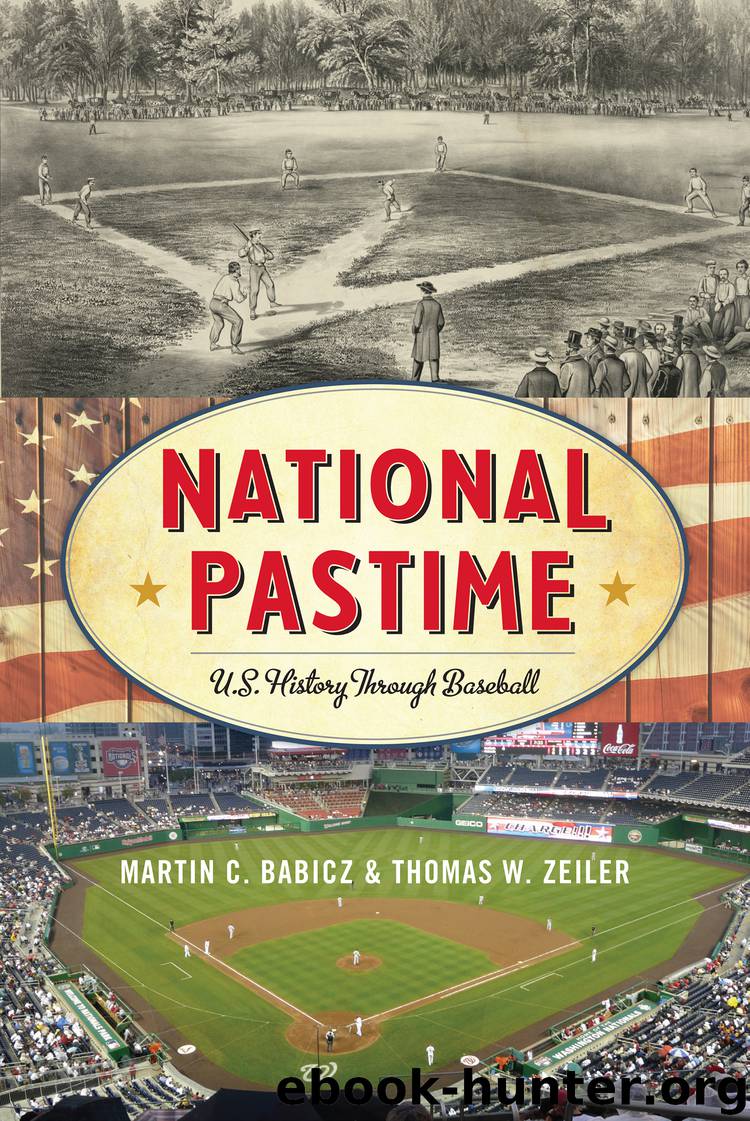National Pastime by Babicz Martin C.; Zeiler Thomas W.; & Thomas W. Zeiler

Author:Babicz, Martin C.; Zeiler, Thomas W.; & Thomas W. Zeiler [Babicz, Martin C. & Zeiler, Thomas W.]
Language: eng
Format: epub
Publisher: Rowman & Littlefield Publishers
Published: 2017-10-03T04:00:00+00:00
13
Change and Revolution (1960 to 1975)
the sixties were a period of political unrest that unleashed various protest movements that were still active through the 1970s. These reform movements transformed American society. The most significant social movement of the era was the civil rights movement, discussed in chapter 11, but other crusades—including the women’s movement, which sought to end gender discrimination; the antiwar movement, which opposed US involvement in the Vietnam War; and the counterculture and youth movement, which promoted individuality over conformity—also shaped the sixties and seventies. These protest movements left their imprints on the era and on baseball.
In October 1969 center fielder Curt Flood received a call from someone in the St. Louis Cardinals office informing him that he had been traded to the Philadelphia Phillies. Flood, a three-time all-star who had helped lead the Cardinals to the 1967 and 1968 National League pennant and to the 1967 World Series championship, responded with stone-cold silence. He did not want to go from a perennial pennant contender to a team that finished thirty-seven games out of first place. Accustomed to the comforts of Busch Memorial Stadium, which had opened in 1966, he did not want to play in Philadelphia’s antiquated Connie Mack Stadium. And Flood, an African American, did not want to play before Philadelphia’s notoriously belligerent and often racist fans. He was also angry that the call had come from an underling, rather than from general manager Bing Devine.
Frustrated, Flood turned to Marvin Miller, the executive director of the new players’ union, the Major League Baseball Players Association. Miller, who had only recently turned the thirteen-year-old MLBPA into a bona fide labor union, assured Flood that if he wanted to sue Major League Baseball, the union would bear the legal costs, but he warned the ballplayer that because of Major League Baseball’s antitrust exemption and the history of courts favoring baseball team owners, there was not “a chance in hell of winning.” More importantly, Miller advised him that even if he did win, Flood would not benefit from a lawsuit, as he would likely be driven out of baseball. Flood asked Miller if a lawsuit would benefit others, and when Miller informed him that it would help existing and future players, Flood agreed to pursue litigation. “You’re a union-leader’s dream,” Miller remarked as the two planned their strategy.
In December, Flood sent a letter to Baseball Commissioner Bowie Kuhn protesting that he was not “a piece of property to be bought and sold.” Acknowledging that he had received a contract offer from the Phillies, Flood stated that he believed he had the right to consider offers from other teams before making a decision, and he asked the commissioner to inform the other major league teams of his availability for the 1970 season. Citing the reserve clause, Kuhn rejected Flood’s bid for free agency. Flood went ahead with the lawsuit, and in 1972, in the case of Flood v. Kuhn, the United States Supreme Court upheld the reserve clause and rejected Flood’s assertion that he was a free agent.
Download
This site does not store any files on its server. We only index and link to content provided by other sites. Please contact the content providers to delete copyright contents if any and email us, we'll remove relevant links or contents immediately.
Machine Learning at Scale with H2O by Gregory Keys | David Whiting(3658)
Never by Ken Follett(3548)
Liar's Poker by Michael Lewis(3230)
The Ultimate Backcountry Survival Manual by Aram Von Benedikt; Editors of Outdoor Life;(3173)
Will by Will Smith(2592)
The Partner by John Grisham(2286)
Friends, Lovers, and the Big Terrible Thing by Matthew Perry(2017)
Can't Hurt Me: Master Your Mind and Defy the Odds - Clean Edition by David Goggins(2011)
Taste by Kris Bryant(1806)
HBR's 10 Must Reads 2022 by Harvard Business Review(1702)
A Short History of War by Jeremy Black(1677)
Never Finished: Unshackle Your Mind and Win the War Within by David Goggins(1563)
The Arm by Jeff Passan(1528)
515945210 by Unknown(1524)
The Dodgers by Schiavone Michael;(1479)
The Yogi Book by Yogi Berra(1426)
443319537 by Unknown(1400)
A Game of Thrones (The Illustrated Edition) by George R. R. Martin(1377)
Road Games by Road Games(1373)
